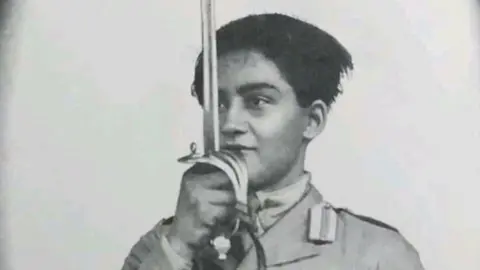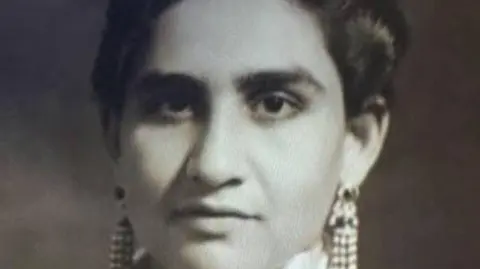 Shams Ur Rehman Alavi
Shams Ur Rehman AlaviAbida Sultaan was nothing like your typical princess.
She wore her hair brief, shot tigers and was an ace polo participant. She flew planes and drove herself round in a Rolls-Royce from the age of 9.
Born in 1913 right into a household of courageous ‘begums’ (a Muslim girl of excessive rank) who dominated the northern princely state of Bhopal in British India for over a century, Abida continued their legacy of defying stereotypes round ladies normally and Muslim ladies specifically.
She refused to be in purdah – a observe adopted by Muslim, and a few Hindu ladies, of sporting garments that conceal them and secluding themselves from males – and have become inheritor to the throne on the age of 15.
Abida ran her father’s cupboard for greater than a decade, rubbed shoulders with India’s outstanding freedom fighters and would finally come to have a ringside view of the hate and violence the nation disintegrated into after it was partitioned in 1947 to create Pakistan.
She was groomed from a younger age to tackle the mantle of ruler beneath the steerage of her grandmother, Sultan Jehan, a strict disciplinarian who was the ruler of Bhopal.
In her 2004 autobiography, Memoirs of a Insurgent Princess, Abida writes about how she needed to get up at 4 within the morning to learn the Quran – the non secular textual content of Islam – after which proceed with a day crammed with actions, which included studying sports activities, music and horse using, but additionally included chores like sweeping the ground and cleansing bogs.
“We women weren’t allowed to really feel any inferiority on account of our intercourse. All the things was equal. We had all the liberty {that a} boy had; we may trip, climb bushes, play any sport we selected to. There have been no restrictions,” she stated in an interview about her childhood.
Abida had a fierce, unbiased streak at the same time as a toddler and rebelled towards her grandmother when she compelled her into purdah on the age of 13. Her chutzpah coupled together with her father’s broad-mindedness helped her escape the observe for the remainder of her life.
Already inheritor to the throne of Bhopal, Abida stood the prospect of changing into a part of the royal household of the neighbouring princely state of Kurwai as effectively when on the age of 12, she was married off to Sarwar Ali Khan, her childhood pal and ruler Kurwai. She described her nikah (marriage ceremony), about which she was clueless, in hilarious element in her memoir.
She writes about how at some point, whereas she was pillow-fighting together with her cousins, her grandmother walked into the room and requested her to decorate up for a marriage. Solely, nobody instructed her that she was the bride.
“No-one had ready or instructed me on find out how to conduct myself, with the outcome that I walked into the nikah chamber, pushing the gathered ladies out of my approach, my face uncovered, sulking as normal for being chosen once more for some new experiment,” she writes.
The marriage was temporary like Abida’s marriage, which lasted for lower than a decade.
 Shams Ur Rehman Alavi
Shams Ur Rehman AlaviMarried life was troublesome for Abida, not simply due to her younger age but additionally due to her strict, pious upbringing. She candidly describes how a lack of information and discomfort with intercourse took a toll on her marriage.
“Instantly after my marriage ceremony, I entered the world of conjugal trauma. I had not realised that the consummation that adopted would go away me so horrified, numbed and feeling unchaste,” she writes and provides that she may by no means deliver herself to “settle for marital relations between husband and spouse”. This led to the breakdown of her marriage.
In her paper on intimacy and sexuality within the autobiographical writings of Muslim ladies in South Asia, historian Siobhan Lambert-Hurley underscores how Abida’s sincere reflections on sexual intimacy together with her husband tear aside the stereotype that Muslim ladies don’t write about intercourse, by presenting an unabashed voice on the subject.
After her marriage fell aside, Abida left her marital dwelling in Kurwai and moved again to Bhopal. However the couple’s solely son, Shahryar Mohammad Khan, turned the topic of an unsightly custody dispute. Pissed off by the drawn-out battle and never desirous to half together with her son, Abida took a daring step to make her husband again off.
On a heat night time in March 1935, Abida drove for 3 hours straight to succeed in her husband’s dwelling in Kurwai. She entered his bed room, pulled out a revolver, threw it in her husband’s lap and stated: “Shoot me or I’ll shoot you.”
This incident, coupled with a bodily confrontation between the couple through which Abida emerged victorious, put an finish to the custody dispute. She proceeded to lift her son as a single mom whereas juggling her duties as inheritor to the throne. She ran her state’s cupboard from 1935 until 1949, when Bhopal was merged with the Indian state of Madhya Pradesh.
Abida additionally attended the round-table conferences – known as by the British authorities to resolve the long run authorities of India – throughout which she met influential leaders like Mahatma Gandhi, Motilal Nehru and his son, Jawaharlal Nehru, who was to turn into India’s first prime minister.
She additionally skilled first-hand the deteriorating relationship between Hindus and Muslims and the violence that broke out within the aftermath of India’s partition in 1947.
 Shams Ur Rehman Alavi
Shams Ur Rehman AlaviIn her memoir Abida describes the discrimination she started dealing with in Bhopal; how her household, who had lived there peacefully for generations, started to be handled as “outsiders”. In one in all her interviews, she spoke a couple of notably disturbing reminiscence she had of the violence that broke out between Hindus and Muslims.
Sooner or later, after the Indian authorities knowledgeable her {that a} prepare carrying Muslim refugees would arrive in Bhopal, she went to the railway station to oversee the arrival.
“When the compartments have been opened, they have been all lifeless,” she stated and added that it was this violence and mistrust that drove her to maneuver to Pakistan in 1950.
Abida left quietly, with solely her son and hopes for a brighter future. In Pakistan, she championed democracy and girls’s rights by her political profession. Abida died in Karachi in 2002.
After she left for Pakistan, the Indian authorities had made her sister inheritor to the throne. However Abida remains to be identified in Bhopal, the place folks discuss with her by her nickname ‘bia huzoor’.
“Spiritual politics over the previous few years have chipped away at her legacy and he or she is not spoken about as a lot any extra,” says journalist Shams Ur Rehman Alavi, who has been researching Bhopal’s ladies rulers.
“However her identify is not prone to be forgotten anytime quickly.”
Comply with BBC Information India on Instagram, YouTube, Twitter and Facebook.

